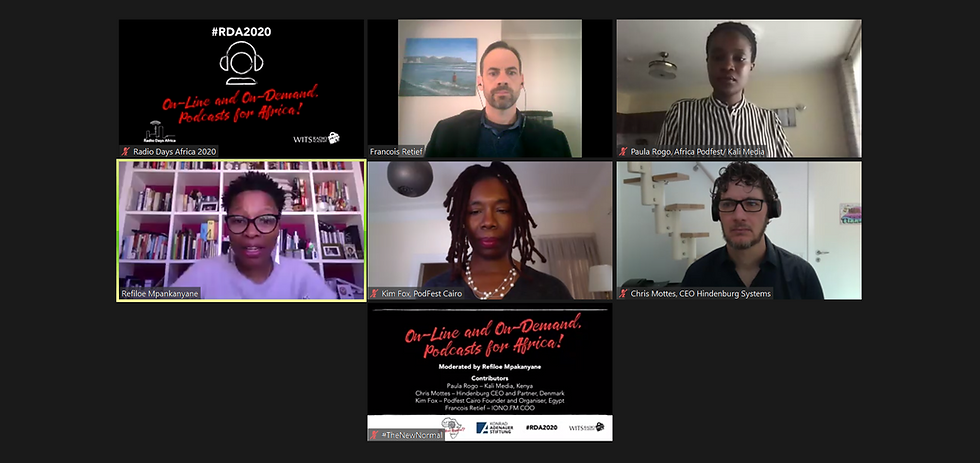Podcasts help amplify alternative voices in Africa
- by Ntombi Mkandhla
- Jul 16, 2020
- 3 min read
Podcasting is on the rise in Africa, giving content creators opportunities to access alternative audiences outside of mainstream media.
“A lot of the popular podcasts and the podcasters who's really done well, at least within the Kenyan context, are those who offer content outside of what the mainstream media is covering,” said Paula Rogo, founder and CEO of Kali Media in Kenya during the 2020 Radio Days Africa conference session held on July 15.
Rogo spoke during a discussion on Podcasting in Africa moderated by South African broadcaster Refiloe Mpakanyane with Kim Fox, PodFest Cairo founder and organiser in Egypt, Chris Mottes CEO and partner of Hindenburg Systems in Denmark and Francois Retief, COO of iono.fm in South Africa.

Retief said iono.fm had over 1200 content providers on its platform with a “strong” base in Africa. The majority of content providers on the platform are South Africans, Retief said.
“In South Africa, with a population of about 50 million, we had close to six million people on our platform last year,” he said.
While these figures highlight podcasting’s growth, Retief said podcasting was still competing against larger established industries.
Local South African radio stations such as Ukhozi FM pulled in over 7 million weekly listeners between April 2019 and March 2020 according to the Broadcasting Research Council of South Africa. While radio still trumps podcasting in terms of getting audiences, the need for alternative voices outside of mainstream media provides African podcasters space and opportunity to access their own audiences.
Rogo highlighted podcasts such as AfroQueer, a podcast that caters to the African LGBT+ community offering new voices and opinions in niche spaces.
“Podcasting also opens up the opportunities and has room for innovation and creativity, which makes it even more exciting,” Rogo said.
However, as a professor of practice in journalism and mass communication at the American University of Cairo, Fox noted that students do not always have a creative approach to podcasting.
“[It] is very unfortunate because they really want to go down a traditional road. If I asked them, how are you going to monetise your podcast idea? Oh, I'm going to post it on YouTube and we'll get some ad revenue from there [...]
“Give me something that's really unique and creative that maybe takes advantage of fintech. And that's when they get sort of stuck. And I feel like we need to do a bit of a podcast hackathon so we can say, like, what are the unique ways that we're not tapping into that aren't so mainstream?” Fox said.
Another issue raised at the session is that the majority of voices heard on the podcast airwaves are in English.
“We are pretty much western facing when it comes to the medium, [...] And it is a matter of economics, I guess. Who's able to share it?” Mpakanyane said.
Mottes acknowledged that producers gravitated towards producing podcasts in English over local languages.
“We're trying to specifically address a lot of smaller groups that wouldn't have the funding to be able to create an oral history or storytelling in general in their local language,” he said.
However, Mottes said the dominance of English podcasts in Africa gives podcasters the opportunity to monetise the medium with a “huge” expatriate community in mind.
“And what are they hungry for? News from home, from someone on the ground. You know, not processed through all sorts of politicized media. Someone who necessarily [doesn’t] have a political angle,” he said.
Rogo said the window of opportunity for African podcasters is virtually “wide open” but content creators need to be aware of barriers on the continent such as data access that could challenge creators in reaching their audiences.
“I think the thing that's key is learning from the West and then adapting to what is necessary to Africa,” Rogo said.





Comments